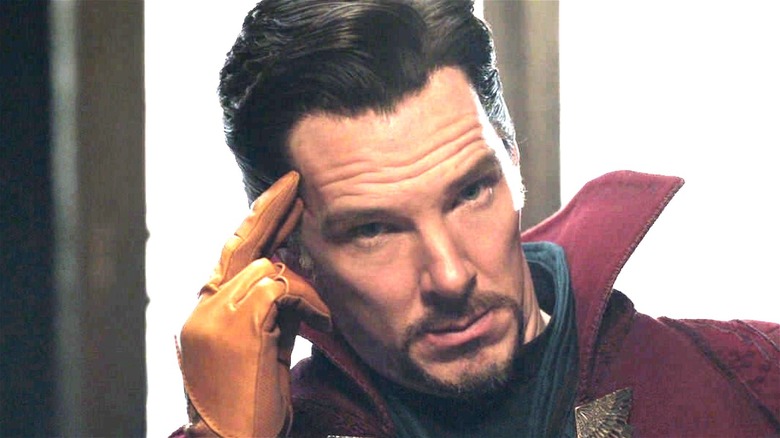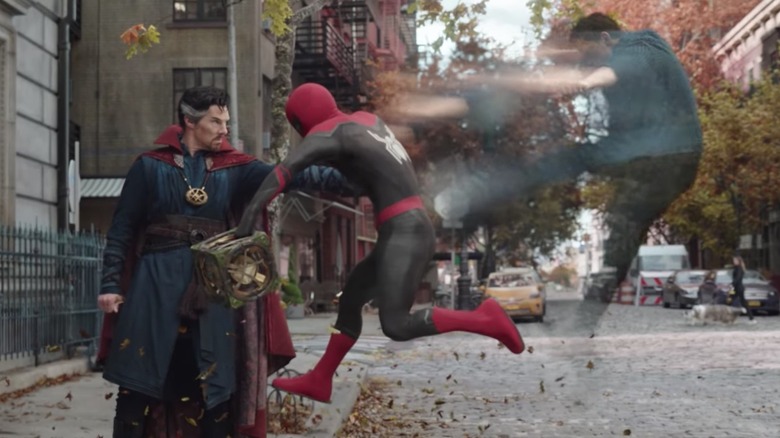The Spider-Man: No Way Home Theory That Explains Doctor Strange's Odd Behavior
When Doctor Strange, as portrayed by Benedict Cumberbatch, returned to the Marvel Cinematic Universe to reprise his role as Doctor Strange for "Spider-Man: No Way Home," it was one of the most substantial storylines the wizard has received since his solo movie back in 2016. In the movie, after Peter Parker (Tom Holland) is exposed to the world as Spider-Man, he seeks Strange's help to put things back to normal. But when the spell goes wrong because of Peter's meddling, it breaks apart the multiverse and brings forth a slate of villains from other realities.
Many fans were quick to note how different they felt the good Doctor was acting in "No Way Home." Strange's initial idea is to use a magic box to return the villains back to worlds where they are doomed to die, and then he loses a fight to Spider-Man, who traps Strange in his own mirror dimension with the power of geometry. The wizard-surgeon is also wearing a Columbia University sweatshirt, acting morose, has let a blizzard from Kamar-Taj blow through a portal into the Sanctum Sanctorum, and says off-putting things like, "Scooby-Doo this s—" (to say nothing of the cringeworthy censored line in the trailer).
One likely explanation for how different the character feels is that across the five MCU films in which Doctor Strange has appeared, he's been handled by five different directors (if you count each Russo brother separately) and by a myriad more writers who each had to adapt Strange for the narrative needs of storylines in which he was not always the main focus. When Marvel finally releases the Sam Raimi helmed "Doctor Strange in the Multiverse of Madness," we may get yet another take on the former Sorcerer Supreme.
Some fans, however, have a different — and admittedly compelling — theory regarding Doctor Strange's sudden mood shift.
Some fans think Doctor Strange might be a tad depressed
When Doctor Strange shows up in "Spider-Man: No Way Home," we learn that, after he disappeared in the "blip" (what Marvel has decided to call the galactic scale genocide carried out by Thanos in "Avengers: Infinity War" presumably because nobody had a thesaurus), he returned five years later to find that Wong (Benedict Wong) had taken the role of Sorcerer Supreme in his absence, even though he would've presumably been the next in line. Meanwhile, based on the trailer for "Doctor Strange in the Multiverse of Madness," it looks like the love of his life, Christine (Rachel McAdams), may have fallen in love with somebody else during that time.
In a highly upvoted post to Reddit, user u/TheMediocreCritic pointed out how much all of that loss and change must weigh on Doctor Strange and posited that the trauma may be causing him to act irrationally, writing, "Dr. strange [sic] seems diffrent [sic] or "off" in Spider-man: No way home [sic] because he is dealing with post-Blip depression."
While Doctor Strange may have foreseen this future back in "Infinity War," during the scene where he famously predicts the "endgame" of the Infinity Saga, knowing what's coming is quite different from living through it. The Stephen Strange of "Spider-Man: No Way Home" seems visibly more fatigued and distraught. Let's be real: you don't wear your old university sweater to work unless you're going through some stuff. As u/TheMediocreCritic concluded, "He feels like the snap [the blip] stole his future from him."
This theory actually makes a great deal of sense, and it'll be interesting to see how it plays out when "Doctor Strange in the Multiverse of Madness" releases on May 6, 2022.

